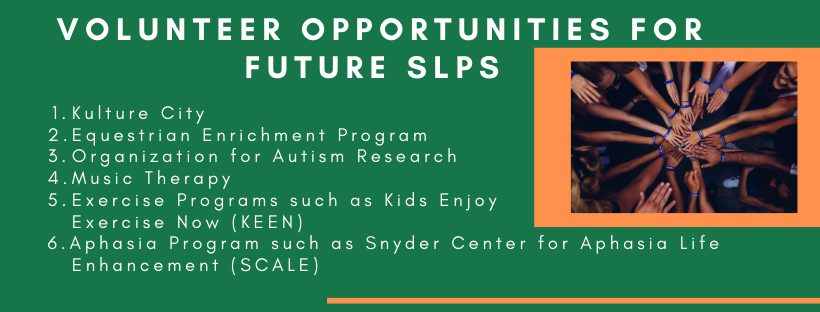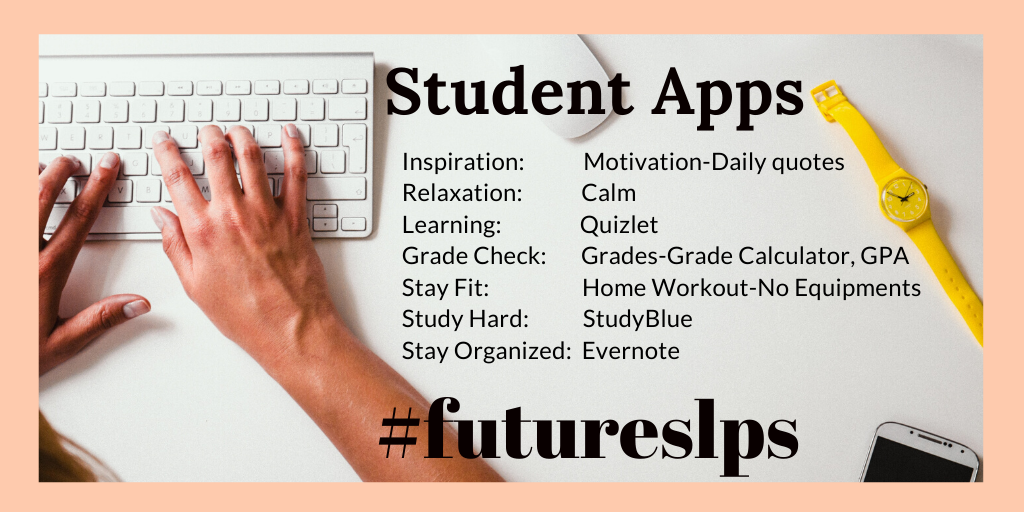|
Here are the links for possible volunteer opportunities listed above:
1. Kulture City: https://www.kulturecity.org/ 2. Equestrian Enrichment Program: https://www.teriinc.org/programs/equestrian/ 3. Organization for Autism Research: https://researchautism.org/get-involved/volunteer/ 4. Music Therapy: https://www.theconnectedcitizen.org/index.php/volunteer-opportunities/music-therapy 5. Exercise Programs such as Kids Enjoy Exercise Now (KEEN): https://www.keengreaterdc.org/volunteers 6. Aphasia Program such as Snyder Center for Aphasia Life Enhancement (SCALE): https://www.leagueforpeople.org/scale
0 Comments
 A lot of times people see the end result of other individual’s lives and do not see the obstacles and/or the hard work that goes into how they made it to where they are today. Below are the 4 Vital Lessons I Learned from Taking the Praxis Test. 1. Vulnerability: I was in a position where I felt like I was the only person going through this, so much of my career relied on this test in order to move forward… I shared with others “my reality” (I did not pass the Praxis test on the first time) and the steps that I experienced to get to the point where I am today. I was able to admit my weakness (not passing the Praxis) and seek help from others who did pass. I embraced the feeling of not knowing the specific outcome and enjoying the journey and the ability to gain further knowledge while studying. I learned how to be vulnerable. 2. Resilience: I took the Praxis test more than one time and experienced disappointment. I would open up the test scores and not want to look for fear that I would see the words “NOT PASSED.” …From each set back I developed the ability to bounce back even quicker than I did before in my life. Life is not fair and different experiences in our life teach us exactly how to develop resilience to keep going even when we may fear the worst. I learned resilience. 3. Underlying Lessons: It is hard to see underlying lessons when you are in various situations in life, but sometimes when we step back and look at the big picture we understand the lesson that was there all along. I am thankful for my underlying lesson that I learned the value of hanging in there, because life does not always give you the necessary tools that you need in the beginning, sometimes you have to develop those skills in order to get to the next chapter of your life. I wanted to look at other careers many times, but I did not let the test define my future career that I absolutely loved. I learned to find the underlying lessons in every experience. 4. Rejection: Last but not least the most important lesson that often times can be looked at as something negative. I felt rejected each time I got back results saying that I did not pass the test. I knew all throughout my life that standardized tests were not my strong point, but now I really felt like this was going to determine where my career would go next. I realized that I just had to find various strategies and ways of studying for the test that worked best for me. Rejection is a good thing because it makes you work harder and appreciate the end result even more. I learned rejection only pushes you to the next level and you appreciate the end result. So how many times did I have to take the Praxis test before I passed…Well let’s just say the third time was a charm :)  Guest Blog Post by Dennis Redley From the recent improvements we've been experiencing, there’s no question that going mobile is the trend of the modern classroom, especially in language literacy. Citing statistics from the United Nations International Telecommunications Union, Mashables’ Sarah Kessler said that in 2010, there were 5.3 billion mobile phone subscriptions worldwide. Kessler cited a separate report from Blackboard and Project Tomorrow saying that 98% of students in the United States have access to smartphones, opening a vast array of opportunities to speed up language proficiency. Today, with its fast pace evolution, we are now presented with various mobile innovations for learning. Augmented Reality With the market version of the Google Glass, Business Insider notes that language learning is an aspect that will highly benefit from it. Writer Megan Rose Dickey said that this becomes possible with the inclusion of the real-time and the text-based translations in classes. In the middle of classroom discussions, you can encourage your students to take a photo of the reading material, and have it translated with the simple “Okay Glass” prompt. Also, software developers are now designing applications intended to assist language learners. Multilingual dictionary company Ectaco is developing an app that allows you to learn a language on the go. Taking a photo of a chair prompts the Glass to translate the word “chair” in Spanish or German. Mobile Applications There are multiple third party applications available on the market, such as the Brain Quest App. A tool dedicated to students with language deficiencies. To make it easier, Verizon has outlined four easy techniques to deal with mobile apps: · Back to basics For beginners, the article suggests to download simple translation apps such as the Google Translate, allowing your students to decipher more than 70 languages. It also offers a dictionary to help students become attuned to the sounds of a new language. · Experiment with your mobile devices Whether you’re using a smartphone or a tablet, change the language settings of the device into the one your students are studying. Then, they must find a way to change the settings. · Expand your vocabulary The article recommends using the Babbel app, which introduces over 2,000 vocabulary words per language. “You won’t have to suffer through ads as you sift through images, vocabulary, and pronunciations of new foreign words,” the article noted. · Start conversations This technique serves as the ultimate test, wherein students will apply all the previously discussed ideas by engaging in a conversation. The Busuu app allows students to converse online with native-speaking individuals. Gamification Kids learn best when you let them deal with facts in the manner that they usually like – being entertained through games. In India, the Human Development Lab at the Carnegie Mellon University is running a program called the Mobile and Immersive Learning for Literacy in Emerging Economies (MILLEE). For 10 years, MILLEE has been offering an array of exciting language learning games, adopting a human-centric approach. In measuring the effectiveness, educators from the university were able to conclude that 27 students that attended the after school program exhibited post-test gains at the end of each intervention. Another popular game wherein you can gather ideas for classroom use is the Mentira, a Spanish language learning game developed at the University of Wisconsin-Madison. In the game, you’ll be virtually present in Albuquerque to interact with people using the Spanish language. As you solve the mystery of the crime that took place 100 years ago, you’re able to master Spanish, especially in pronunciation and delivery. QR Codes Quick Response (QR) codes are two-dimensional bar codes which can be scanned by a mobile device. BBC Active notes that there’s a wealth of benefits that await teachers, especially in the faster dissemination of course syllabus, assignments, and projects. In breaking the language barrier, Colleen Lee of Edudemic outlines simple ways of using QR codes: · “On the door” Lee posted a QR code on the door of the classroom, which her students can scan to know more about their facilitator. She used the Tellegami app to distribute short animated videos in various languages. · Bulletin boards Lee set up a bulletin board where she posted a code that links students to everything about Japan, including the language, culture, and lifestyle. For what it’s worth, mobile technology is indeed being integrated in the educational spectrum. The brewing developments this year and in the coming years can only mean one thing – that the language barrier may become a thing of the past. About the Author Dennis Redley loves to hang out with the kids. He volunteers as a tutor in one of the day care centers in his neighborhood. For more groundbreaking stories, tweet Dennis. |
Categories
All
Archives
November 2021
|
 This work is licensed under a Creative Commons Attribution-NonCommercial-NoDerivs 3.0 Unported License. |
© Copyright 2010-2020 futureslps.com All Rights Reserved Worldwide

